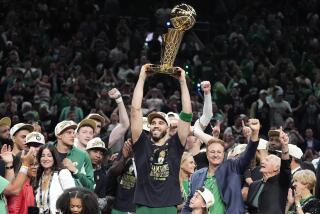He’s Reason the Celtics Are That Way
Never mind the numbers, I don’t make the Boston Celtics any better than the fourth-best team in basketball. If that.
They’ve got Larry Bird, and not much else. They’ve got Robert Parish, but nobody ever mixed him up with Bill Russell. They’ve got Dennis Johnson, but every team’s got a Dennis Johnson. Or two.
They’ve got Kevin McHale. McHale is good, but we’re not talking Michael Jordan here, either.
They’ve got Danny Ainge, Greg Kite and Jerry Sichting. I mean, let’s face it, spear carriers. The guys with the brooms, following the elephants.
The Atlanta Hawks are better. Milwaukee was, too. I’d have to guess the Detroit Pistons are. I know the Lakers are and I’d have to figure the Dallas Mavericks might be.
The Celtics have no bench. They’re old. They’re tired. They walk a lot. Sometimes their games look like a marathon dance.
All they do is win. Go figure.
Is Bird that good? Or just that lucky? Does the ball always just happen to bounce his way? Or does he just know something about the game no one else does? Is there this little voice that whispers in his ear where nobody else can hear saying, “OK, five feet to your left on this--and be ready!”?
These guys win games that have been lost. They win games where they’ve been outrun, outshot, even out-rebounded. But never out-guessed.
I don’t know how you explain it. Except to say the Celtics seem to have acquired a style , a bearing, a mien, almost a supercilious attitude, as if they were surveying the rest of the league through a monocle and finding it terribly distasteful, beneath them. They’re almost like the British Raj in India, expecting to be addressed as “Your Lordship” and treated as royalty, or even deity.
What I do know is how they got that way.
Every institution is the shadow of a man. The New York Yankees became the New York Yankees when the owner bought Babe Ruth from the Boston Red Sox for $125,000, and the game never was the same. Notre Dame became the Fighting Irish and a symbol of 20th Century sport when they hired a fighting Norwegian with a broken nose and a fighter’s eyes and he changed the topography of American football.
The easy answer is, the Celtics became the Celtics, traditional hegemonies of professional basketball, when they signed William Fenton Russell in the fall of 1956.
Much is made of the fact that Ben Kerner, owner of the St. Louis Hawks, made a terrible mistake when he gave up the rights to Russell--whose talents were not as manifest in a stat sheet as they were on a parquet floor--for Easy Ed Macauley and the draft rights to Cliff Hagan.
But Kerner might have made an even bigger mistake four years earlier, when he let a coach named Arnold (Red) Auerbach go from his prehistoric NBA franchise in the Tri-Cities area of Moline and Rock Island, Ill., and Davenport, Iowa.
Auerbach was your typical New York street-wise guy, unsentimental, combative, abrasive. He saw life as a street fight in which you got the first punch in, if you had any sense. He was quick to anger, pugnacious, and slow to add the grace note. He was impatient with fools or those he considered to be--which included a large body of mankind--and, like Vince Lombardi, he cared little for the color of a man’s skin, only that of his backbone.
Auerbach walked into Boston (he quit jobs without hesitation the minute he found out owners were not going to do it his way--Auerbach didn’t mind failing for his own mistakes but he despised failing because of somebody else’s) and he immediately alienated the town, the press and the ownership by refusing to draft Bob Cousy, whom most people thought at the time should not only be in a Celtic uniform but maybe in a stained-glass window as well.
Red Auerbach built the Celtics. His way. He infused the arrogant “We’re in charge here!” Celtics’ attitude. He recruited the mentally tough like himself and Russell.
“Auerbach never tried to make a friend in his life,” rival coach Alex Hannum used to say. “And if you became an enemy, that was OK, too.” He had more of those than the German general staff.
He thrived on contention. So did the Celtics. Their attitude of superiority, implanted in the Auerbach-Russell era, persists to this day. It is a team that needles itself and plays with the kind of impersonal, unsentimental perfection that is a hallmark of Celtic basketball.
It is a team that, like the ex-redhead who put his imprimatur on them, may lose a battle but never concede the war. They just know they’re better than you. Sometimes, it just takes them a little longer to show it.
More to Read
Go beyond the scoreboard
Get the latest on L.A.'s teams in the daily Sports Report newsletter.
You may occasionally receive promotional content from the Los Angeles Times.










